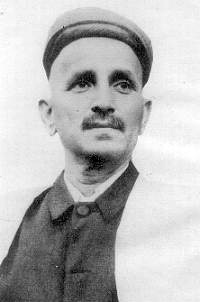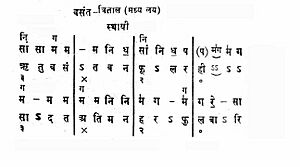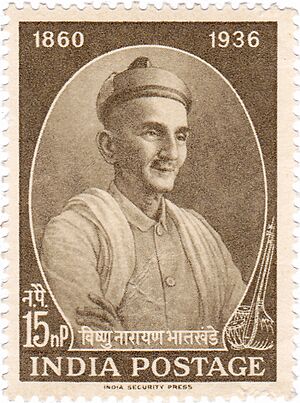Vishnu Narayan Bhatkhande facts for kids
Quick facts for kids
Vishnu Narayan Bhatkhande
|
|
|---|---|
 |
|
| Background information | |
| Born | 10 August 1860 Bombay, India |
| Origin | India |
| Died | 19 September 1936 (aged 76) Bombay, India |
| Genres |
|
| Years active | 1875–1935 |
Pandit Vishnu Narayan Bhatkhande (born August 10, 1860 – died September 19, 1936) was an important Indian musicologist. A musicologist is someone who studies music in a scientific way. He wrote the first modern books about Hindustani classical music. This type of music had been passed down mostly by people teaching each other, not through written rules.
For a long time, the rules for ragas (melodies in Indian music) were confusing. Old texts were hard to understand. Bhatkhande changed how ragas were grouped. He created the thaat system, which is still used today. He also wrote many bandishes (musical compositions) that helped explain the rules of ragas clearly.
Contents
Early Life and Music Journey
Vishnu Narayan Bhatkhande was born on August 10, 1860, in Walkeshwar, Bombay (now Mumbai). His father loved classical music. He made sure Vishnu Narayan and his brothers and sisters learned music.
When he was 15, Bhatkhande started learning the sitar. He also began studying old Sanskrit books about music theory. He earned a degree from Deccan College in Pune in 1885. In 1887, he got a law degree and worked as a lawyer for a short time.
In 1884, Bhatkhande joined a music club in Bombay called Gayan Uttejak Mandali. This helped him learn more about music. He studied there for six years. He learned many songs in different styles like khayal and dhrupad. Music was a hobby for him until 1900. After his wife and daughter passed away, he stopped being a lawyer. He then gave all his time to music.
Bhatkhande's Music Research
Bhatkhande traveled all over India. He met with famous musicians, called ustads and pandits. He wanted to learn about different music styles. He also studied ancient music books like the Natya Shastra.
After his family's loss, Bhatkhande decided to organize Hindustani music. He wanted to create a clear system for it. He visited places like Baroda, Gwalior, and Rampur. In Rampur, he learned from Ustad Wazir Khan, a famous veena player.
In 1904, Bhatkhande traveled to South India. He wanted to learn about Carnatic music. He met important musicians there. But it was hard because of the language barrier. He wrote about his trip in a book called Meri Dakshin Bharat Ki Sangeet Yatra.
During his travels, he found two important books about Carnatic music. These books helped classify ragas. Using these and his own observations, Bhatkhande created a system. He classified Hindustani ragas into ten musical scales, called thaats. This system is similar to the melakartas in Carnatic music.
Bhatkhande's first published work was Swar Malika. It described many ragas. In 1909, he published Shri Mallakshaya Sangeetam in Sanskrit. To make music knowledge available to everyone, he wrote about his Sanskrit book in Marathi. This became a four-volume series called Hindustani Sangeet Paddhati. These books are now very important for anyone studying Hindustani classical music.
Bhatkhande's system for writing down music became the standard. Even though others tried to improve it, his way remained popular.
Starting Music Schools
Bhatkhande started many schools and colleges in India. He wanted to teach Hindustani music in a structured way. In 1916, he helped reorganize the Baroda state music school. Later, he helped start the Madhav Music College in Gwalior.
In 1926, the Marris College of Music was started in Lucknow. Bhatkhande created the study materials for this college. This was a huge achievement. Before this, music knowledge was mostly taught by teachers directly to their students. The college was later renamed Bhatkhande College of Hindustani Music. Today, it is known as Bhatkhande Music Institute (Deemed University).
Bhatkhande also created a series of textbooks called Hindustani Sangeet Kramik Pustak Maalika. He also started the All India Music Conferences. These meetings brought together musicians from both Hindustani and Carnatic styles.
Later Life and Legacy
Bhatkhande became ill in 1933. He passed away on September 19, 1936, in Mumbai.
Manuscripts Edited by Bhatkhande
Bhatkhande helped edit and publish many important old music books. Some of these include:
- Swara Mela Kalanidhi by Ramamatya
- Chaturdandi Prakashika by Venkatamakhin
- Raga Lakshanam
- Raga Tarangini by Lochan
- Raga Tatva Vibodh by Shriniwas
- Sadraga Chandrodaya by Pundarik Vithal
- Raga Manjari by Pundarik Vithal
- "Raga Mala" by Pundarik Vithal
- Nartan Niranaya by Kashinath Shashtri Appa Tulsi
- Sangeet Sudhakar by Kashinath Shashtri Appa Tulsi
- Sangeet Kalp Drumankur by Kashinath Shashtri Appa Tulsi
- Raga Chandrika by Kashinath Shashtri Appa Tulsi
- Raga Chandrika Sar (Hindi)
 | Frances Mary Albrier |
 | Whitney Young |
 | Muhammad Ali |



